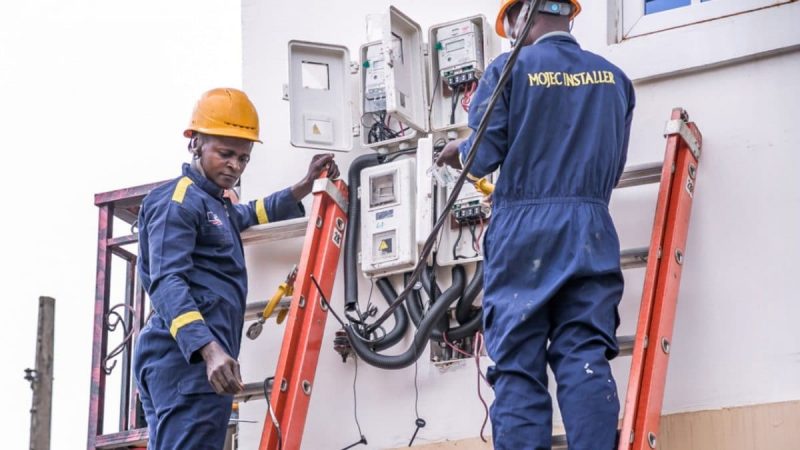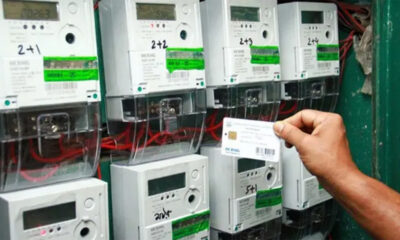Business
DID YOU KNOW? It is illegal for Ikeja Electric, AEDC to disconnect customers’ power without prior notice

A serving distribution company (DisCo) is obliged by the law to notify its customers in writing prior to the disconnection of electricity service in Nigeria. Surprised, right?
This is according to the Nigerian Electricity Regulatory Commission (NERC) regulation on Connection and Disconnection Procedures for Electricity Service (CDPES).
The NERC, empowered by the Electric Power Sector Reform (EPSR) Act, 2005, has an obligation to ensure that the electricity supply industry is efficiently run to satisfy electricity needs of Nigerians.
According to the EPSR Act, NERC is vested with the power to ‘establish appropriate consumers rights and obligations regarding the provision and use of electricity services amongst others.
WHEN A DISCO CAN DISCONNECT CUSTOMERS’ ELECTRICITY SUPPLY
According to the CDPES regulation, a DisCo can disconnect supply when the customer refuses to pay the amount correctly billed, at the payment date.
This is dependent on the following factors:
- The payment date must be clearly indicated on the bill for a DisCo to be eligible to disconnect its customer’s power supply.
- The bill must have been delivered 10 working days before the payment deadline.
- A DisCo must ensure that the payment date has not been superseded by a subsequent payment date issued to the same customer.
That’s not all.
READ ALSO:
- Detained Soldier: Why NYSC may not interfere with Army’s in-house policy — NYSC staff
- I will be available for AFCON, says Osimhen … Napoli striker gets face mask
- Police nab five for running sex ring for bandits, 21 other suspects
The distribution company must have checked its records to be sure that the bill had not been paid.
Also, the regulation stated that electricity supply could be disconnected if the customer refuses to provide acceptable identification or security deposit, after the DisCo’s prior written notice.
HOW SHOULD A WARNING BE ISSUED BY A DISCO?
It is unlawful for a DisCo to barge into a customer’s premises to disconnect electricity without first writing to the supply address, even though the customer had outstanding bills before the disconnection date.
The regulation said that before disconnection, the DisCo must have issued a written warning, stating specifically that the customer’s electricity supply will be disconnected, if the payment is not remitted at the appropriate date.
The written warning must contain the date it was delivered to the customer’s address and a telephone number or address where the customer could call for assistance to pay the outstanding bill.
WHEN CAN A DISCO DISCONNECT CUSTOMERS’ ELECTRICITY SUPPLY WITHOUT NOTICE?
The provision stated that a customer’s electricity supply can be disconnected without notice only on three grounds.
When a customer is illegally connected to the DisCo’s network, the company could disconnect the power supply without notice.
Also, when the customers’ installation is deemed to be dangerous to the DisCo’s network, the quality of supply to other customers, it would be justifiable to cut off the electricity supply of such customers.
READ ALSO:
- Buhari’s fierce critic, Gov. Ortom, hails him over refusal of Electoral Act
- Electoral bill: Senators collect signatures to override Buhari
- Nursing mother tackles husband over abandonment, says hubby claims twins, CS are taboos
WHAT A DISCO SHOULD DO WHEN A CUSTOMER’S METER CANNOT BE ACCESSED
According to NERC’s provision, due to omission by the customer, a meter in the premises of a customer cannot be read for three consecutive times, the serving DisCo could disconnect power supply.
The regulation stated further that this could be done only after the customer has been informed of the meter inaccessibility by written notice or telephone contact. This notification must include a request for the client to provide an access arrangement.
Furthermore, the provision said that the DisCo should proceed to issue a warning notice to the customer, stating that unless access is granted, in not less than 10 working days, electricity will be disconnected.
WHAT HAPPENS WHEN A CUSTOMER’S ELECTRICITY SUPPLY IS DISCONNECTED
The Act noted that the DisCo has an obligation to notify its customer in writing — stating the date, time and reason for the disconnection. Also, the DisCo should inform its client about steps to take for reconnection.
FINE FOR WRONGFUL DISCONNECTION
The Act stated that if a DisCo wrongfully disconnects its customer’s power supply, it would have to pay a penalty fee every day or part of a day for the period of wrongful disconnection.
The DisCo would be mandated to pay a daily fee of N1,000 for residential buildings, N1,500 for commercial buildings and N2000 for industrial and special customer classifications.
The cable
Business
Naira strengthens, gains N29.89 against US dollar

Naira strengthens, gains N29.89 against US dollar
The Nigerian Naira closed the week on a positive note, appreciating by N29.89 against the US Dollar in the official market.
According to data from the Central Bank of Nigeria (CBN), the Naira traded at N1,517.93 per dollar on Friday, reflecting a 1.9% increase from Thursday’s closing rate of N1,547.82.
READ ALSO:
- EL-Rufai, police clash over ex-commissioner’s arrest
- How to lower fuel consumption of your car
- South African ambassador ‘no longer welcome’ in US, Rubio says
The currency’s recovery comes after a period of decline since March 5, offering a sign of relative stability. In recent months, the Naira has traded within a range of N1,500 to N1,900 against the dollar across both official and parallel markets.
This uptick suggests ongoing efforts to stabilize the currency may be yielding results, as market watchers remain hopeful for sustained improvements.
Naira strengthens, gains N29.89 against US dollar
Auto
How to lower fuel consumption of your car

How to lower fuel consumption of your car
When President Bola Tinubu announced an end to fuel subsidy at the inception of his regime in 2023, many motorists were jolted by the expected impact it would have on the cost of keeping their vehicles on the road.
Many Nigerians were also concerned about the impact it would have on the cost of living, especially the prices of goods, services and transportation.
And their fears were genuine; prices of goods went up astronomically and there were complaints of hardship all over the country.
This led to a swift drop on the sales of big cars, especially Sport Utility Vehicles. Many Nigerians quickly parked these cars in their homes and some immediately put up theirs for sale while others quickly bought smaller cars that they presumed would consume less fuel. They forgot that the rainy season would not be fair to the roads and their new small sedans, especially the bumpers and underneath the cars.
Those living in flood-prone areas like Lekki and some seasonally flooded areas in Rivers, Delta and Bayelsa states can attest to the advantages of SUVs over sedans from their expenses. With some of these expected challenges, it didn’t take long for the average Nigerian motorist to adjust and live with the negative impacts of the fuel subsidy removal.
Though the challenge persists, coupled with the poor state of the roads across the country, it has been almost impossible for Nigerians to totally do away with their big cars and SUVs which are renowned for higher fuel consumption. It is the classical case of choosing between the devil and the deep blue sea.
READ ALSO:
- South African ambassador ‘no longer welcome’ in US, Rubio says
- Nasir El-Rufai’s scorched-earth one-man opposition, By Farooq Kperogi
- Osimhen scores hat-trick as Galatasaray demolish Antalyaspor
Today, Vanguard offers you some tips on how to ensure maximum fuel economy in your vehicles at a time like this. It is clear that by improving your car’s fuel economy, you’re helping to reduce the drain on your wallet. With some simple driving tips and habits, your fuel can take you further. A combination of good driving habits, and proper vehicle maintenance of your car is essential.
The Tips
*When driving, accelerate and brake gently, quick starts and stops waste fuel, but smooth driving boosts your kilometres per litre. Driving at slower speeds leads to better fuel efficiency.
Reducing speed by 10-20 kph can help. Keep a steady speed, you may use your cruise control on motorways because when you drive at a consistent speed, you save fuel.
•Watch the traffic ahead, it will help you predict what other drivers will do or intend to do. This helps you to avoid braking and speeding up.
•Also avoid idling your engine for long periods even when it is stationary as it wastes fuel. Switch off the engine if you need to stop for more than a minute.
•Also limit short journeys, and be aware that cold starts use more fuel.
•As a motorist, ensure that your tyres are appropriately gauged. Soft tyres cause drag and waste fuel. Check pressures often and inflate correctly.
Many drivers don’t know that proper inflation of their car tyres contributes significantly to the fuel economy. Under inflated tyres have a higher rolling resistance on the road. This means that your tyres generate more friction and rolling resistance and will increase fuel consumption.
READ ALSO:
- My wife is a pastor, can’t be Bigot, Tinubu tells Catholic bishops
- Electricity: TCN blocks access to data from DisCos
- Customs seize 1,149 jerry cans of petrol in Taraba
If your four tyres are underinflated by 10 psi, this could increase your fuel consumption by 10 per cent. Car manufactures always have the recommended tyre gauge inscribed on the drivers door frame. Gauge your tyre accordingly and reduce your fuel consumption.
•Correct wheel alignment is vital. It reduces tyre wear and drag. This also saves fuel.
•Many motorists carry all sorts of things in their boots which they hardly need and this adds to the weight of the car, this should be avoided. Note that every extra 50kg of load in your car increases fuel consumption by about two to three percent.
Some used cars from abroad come with a heavy bar attached to the rear for pulling boats and other heavy objects from where they have been imported which is hardly needed in this part of the world. It is advised that you remove them to avoid unnecessary weight.
Some people however believe that this serves as protection when another vehicle hits them from behind, unknown to them that they are paying more to fuel their cars. Lighten your load and remove extra weight from the car. Less weight means better fuel economy.
•Also, reduce drag by removing roof racks as they increase wind resistance which wastes fuel.
•Use your air-conditioning system. Driving with an air-conditioner has an advantage to fuel economy but most drivers think otherwise.
Apart from keeping the interior of your car clear of dust and ensuring the safety of the driver from attacks, it also saves fuel. Driving with windows down at a speed faster than 80km/h causes a lot of wind resistance and more fuel consumption. It is more fuel efficient to drive with your air-conditioner on.
•Maintain the right speed. Avoid over speeding and going slowly too.
While both have safety consequences, they also have an impact on your fuel consumption. It has been established that on highways, your engine works hard to overcome wind resistance.
This means that you will burn up to 15 per cent more fuel at 100km/h and 25 per cent more at 110km/h. On the other way round, if you drive at a speed slower than 50km/h your engine would drop to a lower gear thus using up more fuel. It is advised that driving between 50km/h and 90km/h gives optimal fuel efficiency.
•Many people accelerate their cars as if they are running at Formula 1 Race thereby wasting their fuel unknowingly. Avoid revving your accelerator to a high revolution per minute (RPM). Your engine uses less fuel when it is revolving slower at a lower RPM.
•It is also important to note that aggressive braking is not only a disadvantage to the brake pad but increases fuel consumption.
Slamming on the brakes increases fuel consumption as the car needs to accelerate again. Give a reasonable distance between you and the vehicle in front of you. If you have been driven by a pilot before, you would understand what it means to drive with caution.
READ ALSO:
- 10 ex-Buhari’s ministers to dump APC for SDP
- FG refutes US Congress claim of terrorists targeting Nigeria’s Christians
- Jimoh Ibrahim speaks on Senator Natasha’s petition to IPU
They are very cautious of the vehicles in front of them and avoid them from afar. I am sure that if we take count of professionals who hardly get involved in traffic accidents, the pilot would take the number spot.
•Avoid hard acceleration when moving your car from complete stop or climbing hills as it increases fuel consumption. Most people who drive vehicles with automatic transmission hardly know the advantage of one special feature in the car called cruise control.
If you are driving an automatic car, you can make use of cruise control to keep your speed constant. But if you are driving a manual car, maintain a higher gear when appropriate. This ensures that your engine goes through less revolutions per minute, RPM and ensures less fuel consumption.
•Driving in traffic causes higher fuel consumption. Stop-start traffic puts a lot of pressure on your engine and burns more fuel. Avoid peak traffic if possible. Turn off your engine when it is parked. As long as your engine is on, the fuel is burning. The choice is yours to keep the engine steaming when that car is not moving. It is your fuel that is burning which you can use to cover some kilometers.
•Regular servicing with quality engine oil is key to the longevity of your engine. If your engine is poorly maintained, it will lead to sludge and corrosion build-up which will prevent the engine from working smoothly. Regular maintenance is key.
•Follow your vehicle’s schedule, a healthy engine works better. A clean air filter lets the engine breathe freely. Good airflow improves fuel use. Use the right oil type to reduce friction and boost engine performance. When buying a new car, think about fuel efficiency. Pick a model that fits your needs. If your car has a fuel-saving mode, then use it.
How to lower fuel consumption of your car
Vanguard
Business
Electricity: TCN blocks access to data from DisCos

Electricity: TCN blocks access to data from DisCos
Different interest groups in the Nigerian Electricity Supply Industry (NESI) yesterday raised the alarm as the Independent System Operator (ISO) of the Transmission Company of Nigeria (TCN) blocked access to distribution companies (DisCos) daily load profile on its website.
The section of the website has been inaccessible for over a month with no one offering explanation.
Meanwhile, the Transmission Company of Nigeria (TCN), spokesperson, Ndidi Mbah did not answer calls to her mobile line. She also refused to respond to the WhatsApp message sent to her for inquiry.
Responding to the situation, Sage Consulting, Lead Power Sector Analyst, Mr. Bode Fadipe said the fact that the TCN barred access to the DisCos load profile for this long raises the question if it has something to conceal from the stakeholders.
READ ALSO:
- Customs seize 1,149 jerry cans of petrol in Taraba
- 10 ex-Buhari’s ministers to dump APC for SDP
- FG refutes US Congress claim of terrorists targeting Nigeria’s Christians
He described the website’s daily load profile as the tool with which customers and other members of the public can assess the performance of the energy distributors.
Fadipe stressed that platform should be a validation measure for holding the DisCos accountable.
He said allowing the DisCos to operate without access to the load profile could aid them to reject load.
His words: “If other information is accessible on that platform and it is not a technical issue what could be responsible for that? Do they have anything to hide?
” If they have resorted to that, we call for greater transparency so that it can help us to see performance. I think it is not a very good sign because the power sector is supposed to be a transparent industry where people can pick up information and the public can monitor all the time and be able to hold DisCos responsible.”
Electricity: TCN blocks access to data from DisCos
-

 Opinion2 days ago
Opinion2 days agoNasir El-Rufai’s scorched-earth one-man opposition, By Farooq Kperogi
-

 Politics3 days ago
Politics3 days ago2027: Southern Kaduna group rejects El-Rufai, supports Tinubu
-

 metro3 days ago
metro3 days agoBREAKING: Appeal Court stops Sanusi’s reinstatement as Kano emir
-

 Auto3 days ago
Auto3 days agoThree electric vehicles on display steal show at Lagos Motor Fair
-

 Auto3 days ago
Auto3 days agoTheodore Opara inaugurated as new NAJA chairman, other excos sworn in
-

 Politics2 days ago
Politics2 days ago10 ex-Buhari’s ministers to dump APC for SDP
-

 Education11 hours ago
Education11 hours agoRomanian university offers fully funded scholarships to non-EU and non-EEA students for 2025
-

 News3 days ago
News3 days agoHow Natasha can get her Senate suspension reversed – Akpabio










